I love TV, and I don’t think I watch enough of it.
I’d watch more but it’s so slow*. You can spend weeks of your life trying to hammer through season after season of just one show. In Douglas Coupland’s 1993 novel Microserfs, characters “blitz” movies by watching videos on fast-forward with subtitles switched on.** My friend Katie, equally impatient, listens to audiobooks on chipmunk speed, but I don’t think I could sustain either approach for a full season of TV.
I watch television to get ideas for work. TV shows and community experiences like the ones I design have a lot in common. You need a central conceit which draws people in, and on which you can hang a series of recurring episodes. Action-adventure, problem solving, and play are closely entwined. This year’s non-speaking, musical keynote was inspired by dialogue-free sequences in the TV show Legion.
The teams I work with are pretty explicit about this link between TV and the events we run. The working title for Ann Arbor’s Wondrous Strange event was ‘Weirder Things’.
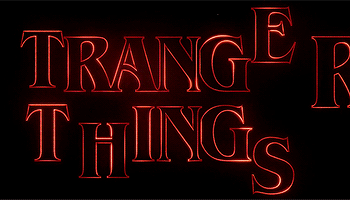
Stranger Things is a difficult one for me because I’m not super into it, and that makes me feel bad. It’s so popular, I feel like I’m missing something. Like I’m out of touch. It’s doubly bad because I grew up immersed in – and totally in love with – the late 80s/early 90s world of Stephen King novels and pirate horror movies on VHS.
People say Stranger Things is about nostalgia, but I don’t know. I think the reason it doesn’t work for me is that it’s more of a pastiche. There’s a gang of Spielberg kids, and a monster with the flesh-flower head of 1982’s The Thing, and a girl called Nancy trying to defeat a supernatural creature using jury-rigged home invasion defences, plus the small-town-meets-secret-lab thing from a million billion Stephen King stories.
Among viewers, the geeks get the references and the non-geeks get vaguely haunted by allusions which they only half register. But I don’t feel the same mix of awe and dread watching Stranger Things that I did with the originals.
Horror is an odd genre because it’s so dependent on pressing us in uncomfortable places relating to our times. Horror works by burlesquing our anxieties about infection, invasion, death, and a thousand other things. The uncomfortable places of the 1980s aren’t necessarily the uncomfortable places of now. There’s no pang.
Watching the finale of Stranger Things Season 1, I found myself thinking: this isn’t scary. And then I asked myself: Which anxieties is this show playing on, those of 2016-17 or 1980-something? Real horror gets derided or denounced as immoral, ludicrous, inappropriate, lowbrow: King’s books were seen as overlong, dumbed-down, literary chewing gum; horror movies provoked equal parts jeers and moral panic in the VHS heyday.
Stranger Things is getting nothing but love. So is it playing on any anxieties at all? Is it popular because it’s basically just a comfort blanket – hiding from the anxieties of today in the already-gone, thirty-years-resolved worries of the Reagan era?
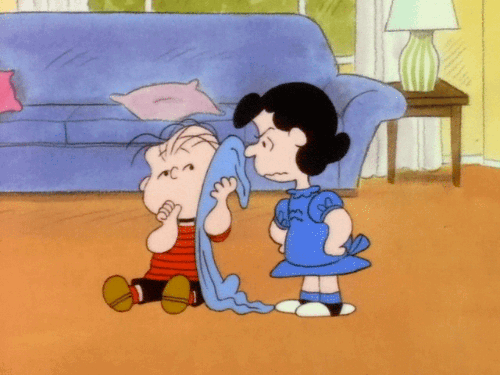
My friend Carol said the one anxiety which maybe got added to Stranger Things was a parent’s fear of losing their child. People who grew up on this diet of 80s dread now have kids of their own and get to see themselves as Winona Ryder, 80s icon turned harried parent.
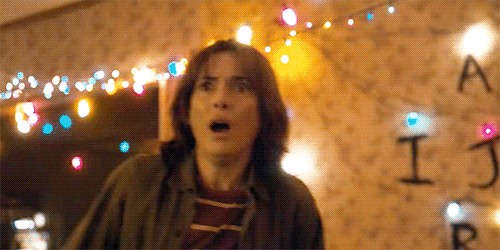
I think this is true, but I also think Stranger Things says surprisingly little to us about 2017, or the 1980s – and it definitely doesn’t say anything much to trouble us about ourselves, which is what made the Stephen King/VHS horror era so compelling in the first place.
Thinking about the show this way made me think of another series which is out now, doing well but which – at least in my little social-life-and-social-media-bubble – people disagree on much more.
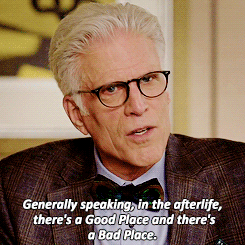
The Good Place is the sitcom which follows a woman who seems to have been mistakenly sent to Heaven in the afterlife. Eleanor Shellstrop tries to become a better person while concealing her true, less-than-pleasant nature, while the world around her becomes increasingly troubled by the presence of an unidentified “bad element”.
The realisation that the comfortable world around you may not be quite what it seems; that you are neither wholly good or wholly bad, and that life refuses to neatly divide into these categories; that doing the right thing might require contemplation and effort, not just being born as the hero of your own story: these things speak to the worries of now.
It also suggests that maybe the people running our society, who seem so benevolent and worthy of our trust, are literal demons.
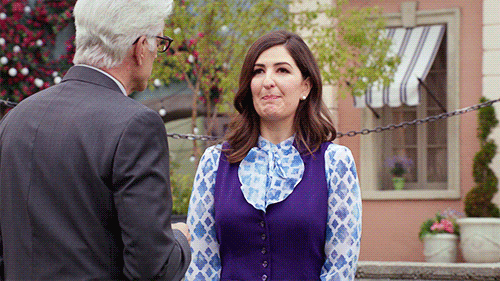
The show also features Janet, a being who serves as a kind of digital assistant for the Good Place, answering questions and maintaining the neighbourhood’s infrastructure. Her character feels pretty 2017, too: as digital devices get more powerful, chatty, and social, of course our fantasies feature stilted, friendly, semi-helpful automata.
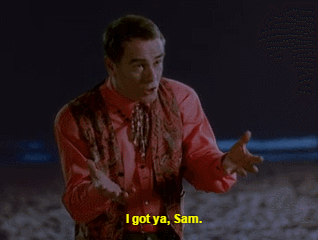
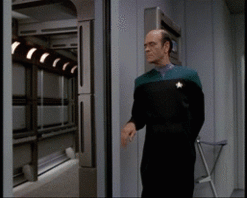
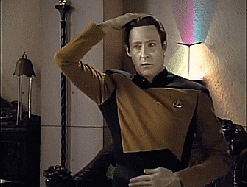
Janet has roots in characters from Quantum Leap‘s hologram Al to Star Trek‘s artificial beings questing-to-be-human, the Doctor and Data, but she’s definitely a figure who’s going to feel very 2010s to future viewers.
She also offers a happy response to our nagging concern that as digital devices get more intelligent and sociable, we will have to treat them with greater concern and respect.
Just as one wouldn’t kick the office cat or ridicule a subordinate, the very idea of mistreating ever-more-intelligent devices becomes unacceptable. While not (biologically) alive, these inanimate objects are explicitly trained to anticipate and respond to workplace needs. Verbally or textually abusing them in the course of one’s job seems gratuitously unprofessional and counterproductive.
-Michael Schrage, “Why You Shouldn’t Swear At Siri“
Janet’s story suggests that if Siri gets smarter, maybe she’ll also become more human. Maybe the journey we make into a future of ever-more-intelligent digital devices will be companionable and hopeful, rather than dystopian.
Of course, that’s the benefit of watching a comedy: you can trust the genre to give you a fairly happy ending. Stranger Things, meanwhile, depends on making you believe that its mysteries are never fully resolved, that there is always another threat to the 80s Reaganite idyll out there; that even if the show never fully scares you, you are never fully safe.
And yet The Good Place is the show that speaks to the most troubling aspects of now.
Maybe I need to make a Good Place immersive roleplay.
Right after I get through Stranger Things Season 2.
*Sometimes that’s the appeal, of course. TV isn’t just about storytelling, it’s about a familiar space and vibe you can return to, characters you can hang out with time and again.
**I tried this with Tarkovsky’s Stalker and it worked but it made me feel like a bad person.
Share this:




